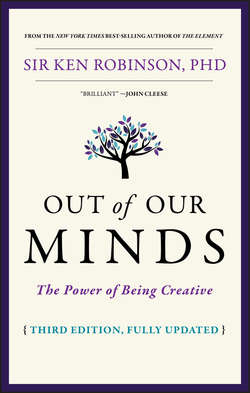Читать книгу Out of Our Minds - Робинсон Кен - Страница 7
На сайте Литреса книга снята с продажи.
PREFACE TO THE THIRD EDITION
ОглавлениеI WROTE THE ORIGINAL EDITION of Out of Our Minds during 2000. A second, fully revised edition was published in 2011. What you have in your hands now is the third edition, which has been thoroughly revised again. Why another new edition?
The main reason I wrote this book in the first place is that the pace and nature of change demand that we think differently about ourselves, about education and about how we run our businesses and institutions. On almost every front, the pace of change has become ever more frantic and the issues at the heart of this book have become more pressing. This new edition is my own attempt to keep pace with these changes.
The second reason is that the arguments I put forward here have become more – not less – urgent, and this edition presents them more sharply. The more complex the world becomes, the more creative we need to be to meet its challenges. Yet many people wonder if they have any creative abilities at all. Out of Our Minds is about why creativity matters so much, why people think they are not creative, how we arrived at this point and what we can do about it. My aims in this book are to help individuals to understand the depth of their creative abilities and why they might have doubted them; to encourage organizations to believe in their powers of innovation and to create the conditions where they will flourish; and to promote a creative revolution in education.
I said in the original introduction that I had called the book Out of Our Minds for three reasons. I still have three reasons and here they are. First, human intelligence is profoundly and uniquely creative. We live in a world that’s shaped by the ideas, beliefs and values of human imagination and culture. The human world is created out of our minds as much as from the natural environment. Thinking and feeling are not simply about seeing the world as it is, but having ideas about it, and interpreting experience to give it meaning. Different communities live differently according to the ideas they have and the meanings they experience. In a literal sense, we create the worlds we live in. We can also re-create them. The great revolutions in human history have often been brought about by new ideas: by new ways of seeing that have shattered old certainties.
Second, realizing our creative potential is partly a question of finding our medium, of being in our element. Education should help us to achieve this, but too often it does not and too many people are instead displaced from their own true talents. They are out of their element and out of their minds in that sense.
Finally, there is a kind of mania driving the present direction of educational policy. In place of a reasoned debate about the strategies that are needed to face these extraordinary changes, there is a tired mantra about raising traditional academic standards. These standards were designed for other times and for other purposes – as I will explain. We will not succeed in navigating the complex environment of the future by peering relentlessly into a rear-view mirror. Today, as when the first edition appeared in 2001, I’m convinced that to stay on this course we would be out of our minds in a more literal sense.
Ken Robinson
Los Angeles, May 2017
